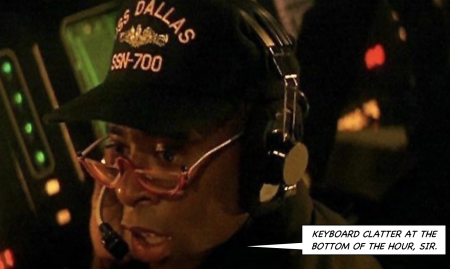Crazy Ivan: Difference between revisions
Jump to navigation
Jump to search
Amwelladmin (talk | contribs) No edit summary |
Amwelladmin (talk | contribs) No edit summary |
||
| (3 intermediate revisions by the same user not shown) | |||
| Line 1: | Line 1: | ||
{{anat|confcall|}}[[Crazy Ivan]] was a Russian submarine manoeuvre in the Cold War, popularised in the ''The Hunt for Red October'', in which a rogue Soviet sub-commander from Dundee would unexpectedly turn hard left<ref>Ironic, | {{anat|confcall| | ||
[[File:Crazy ivan.png|450px|frameless|center]] | |||
}}[[Crazy Ivan]] was a Russian submarine manoeuvre in the Cold War, popularised in the ''The Hunt for Red October'', in which a rogue Soviet sub-commander from Dundee would unexpectedly turn hard left<ref>Ironic, isn’t it?</ref> to “clear his baffles” and ascertain whether he was being followed. | |||
Sample dialogue: | |||
:'''''Jones''': Conn, sonar! [[Crazy Ivan]]!'' | :'''''Jones''': Conn, sonar! [[Crazy Ivan]]!'' | ||
:'''''Capt. Mancuso''': All stop! Quick quiet!'' | :'''''Capt. Mancuso''': All stop! Quick quiet!'' | ||
:'''''Beaumont''': | :'''''Beaumont''': What’s goin’ on?'' | ||
:'''''Jones''': Russian captains sometime turn suddenly to see if | :'''''Jones''': Russian captains sometime turn suddenly to see if anyone’s behind them. We call it “[[Crazy Ivan]]”. The only thing you can do is go dead. Shut everything down and make like a hole in the water.'' | ||
:'''''Beaumont''': So | :'''''Beaumont''': So what’s the catch?'' | ||
:'''''Jones''': The catch is, a boat this big | :'''''Jones''': The catch is, a boat this big doesn’t exactly stop on a dime... and if we’re too close, we’ll drift right into the back of him.'' | ||
The sudden, unexpected nature of the manoeuvre led to the term being popularised in the [[conference-call]]ing world, especially since the advent of Skype, to denote the practice of maliciously taking another participant ''off'' mute<ref>A move not possible before the advent of [[Skype problems|Skype]].</ref> in order to reveal her “[[keyboard clatter|clatter signature]]” leaving defenceless, unwitting and broadside to any [[conference call ambush]] another participant cares to mount. | The sudden, unexpected nature of the manoeuvre led to the term being popularised in the [[conference-call]]ing world, especially since the advent of Skype, to denote the practice of maliciously taking another participant ''off'' mute<ref>A move not possible before the advent of [[Skype problems|Skype]].</ref> in order to reveal her “[[keyboard clatter|clatter signature]]” leaving defenceless, unwitting and broadside to any [[conference call ambush]] another participant cares to mount. | ||
| Line 12: | Line 16: | ||
A boss but, all the same dick, move. | A boss but, all the same dick, move. | ||
{{sa}} | |||
{{ | |||
*[[Skype problems]] | *[[Skype problems]] | ||
{{ref}} | {{ref}} | ||
Latest revision as of 11:36, 18 December 2021
|
Conference Call Anatomy™

|
Crazy Ivan was a Russian submarine manoeuvre in the Cold War, popularised in the The Hunt for Red October, in which a rogue Soviet sub-commander from Dundee would unexpectedly turn hard left[1] to “clear his baffles” and ascertain whether he was being followed.
Sample dialogue:
- Jones: Conn, sonar! Crazy Ivan!
- Capt. Mancuso: All stop! Quick quiet!
- Beaumont: What’s goin’ on?
- Jones: Russian captains sometime turn suddenly to see if anyone’s behind them. We call it “Crazy Ivan”. The only thing you can do is go dead. Shut everything down and make like a hole in the water.
- Beaumont: So what’s the catch?
- Jones: The catch is, a boat this big doesn’t exactly stop on a dime... and if we’re too close, we’ll drift right into the back of him.
The sudden, unexpected nature of the manoeuvre led to the term being popularised in the conference-calling world, especially since the advent of Skype, to denote the practice of maliciously taking another participant off mute[2] in order to reveal her “clatter signature” leaving defenceless, unwitting and broadside to any conference call ambush another participant cares to mount.
A boss but, all the same dick, move.